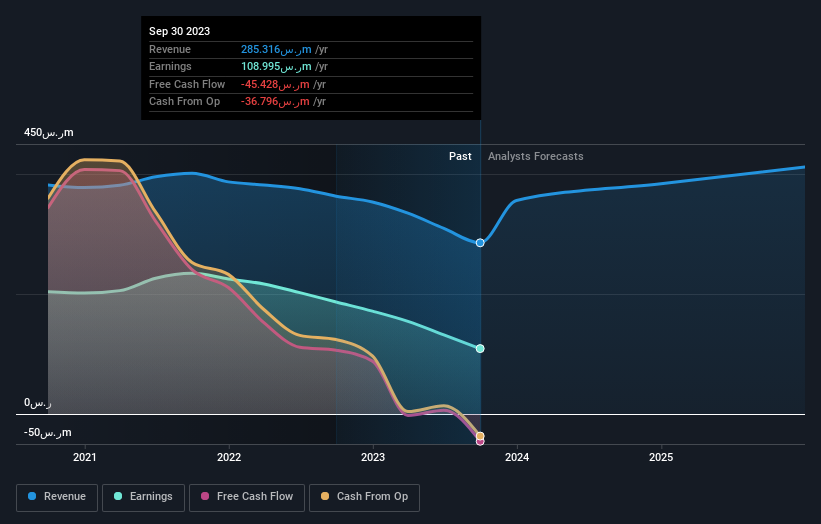- Saudi Arabia
- /
- Consumer Finance
- /
- SASE:4081
Private companies in Nayifat Finance Company (TADAWUL:4081) are its biggest bettors, and their bets paid off as stock gained 13% last week

Key Insights
- Significant control over Nayifat Finance by private companies implies that the general public has more power to influence management and governance-related decisions
- A total of 2 investors have a majority stake in the company with 53% ownership
- 14% of Nayifat Finance is held by insiders
Every investor in Nayifat Finance Company (TADAWUL:4081) should be aware of the most powerful shareholder groups. The group holding the most number of shares in the company, around 48% to be precise, is private companies. Put another way, the group faces the maximum upside potential (or downside risk).
As a result, private companies were the biggest beneficiaries of last week’s 13% gain.
Let's take a closer look to see what the different types of shareholders can tell us about Nayifat Finance.
See our latest analysis for Nayifat Finance

What Does The Lack Of Institutional Ownership Tell Us About Nayifat Finance?
Institutional investors often avoid companies that are too small, too illiquid or too risky for their tastes. But it's unusual to see larger companies without any institutional investors.
There could be various reasons why no institutions own shares in a company. Typically, small, newly listed companies don't attract much attention from fund managers, because it would not be possible for large fund managers to build a meaningful position in the company. On the other hand, it's always possible that professional investors are avoiding a company because they don't think it's the best place for their money. Nayifat Finance might not have the sort of past performance institutions are looking for, or perhaps they simply have not studied the business closely.

Hedge funds don't have many shares in Nayifat Finance. The company's largest shareholder is FALCOM Holding Company, with ownership of 48%. Saud Bin Huwaimel Al Dosari is the second largest shareholder owning 5.1% of common stock, and Abdulaziz Saud Al Blehed holds about 5.0% of the company stock.
A more detailed study of the shareholder registry showed us that 2 of the top shareholders have a considerable amount of ownership in the company, via their 53% stake.
While it makes sense to study institutional ownership data for a company, it also makes sense to study analyst sentiments to know which way the wind is blowing. There is some analyst coverage of the stock, but it could still become more well known, with time.
Insider Ownership Of Nayifat Finance
While the precise definition of an insider can be subjective, almost everyone considers board members to be insiders. Management ultimately answers to the board. However, it is not uncommon for managers to be executive board members, especially if they are a founder or the CEO.
I generally consider insider ownership to be a good thing. However, on some occasions it makes it more difficult for other shareholders to hold the board accountable for decisions.
It seems insiders own a significant proportion of Nayifat Finance Company. It has a market capitalization of just ر.س1.8b, and insiders have ر.س263m worth of shares in their own names. It is great to see insiders so invested in the business. It might be worth checking if those insiders have been buying recently.
General Public Ownership
With a 37% ownership, the general public, mostly comprising of individual investors, have some degree of sway over Nayifat Finance. While this size of ownership may not be enough to sway a policy decision in their favour, they can still make a collective impact on company policies.
Private Company Ownership
It seems that Private Companies own 48%, of the Nayifat Finance stock. Private companies may be related parties. Sometimes insiders have an interest in a public company through a holding in a private company, rather than in their own capacity as an individual. While it's hard to draw any broad stroke conclusions, it is worth noting as an area for further research.
Next Steps:
It's always worth thinking about the different groups who own shares in a company. But to understand Nayifat Finance better, we need to consider many other factors. For instance, we've identified 3 warning signs for Nayifat Finance (2 are potentially serious) that you should be aware of.
Ultimately the future is most important. You can access this free report on analyst forecasts for the company.
NB: Figures in this article are calculated using data from the last twelve months, which refer to the 12-month period ending on the last date of the month the financial statement is dated. This may not be consistent with full year annual report figures.
Valuation is complex, but we're here to simplify it.
Discover if Nayifat Finance might be undervalued or overvalued with our detailed analysis, featuring fair value estimates, potential risks, dividends, insider trades, and its financial condition.
Access Free AnalysisHave feedback on this article? Concerned about the content? Get in touch with us directly. Alternatively, email editorial-team (at) simplywallst.com.
This article by Simply Wall St is general in nature. We provide commentary based on historical data and analyst forecasts only using an unbiased methodology and our articles are not intended to be financial advice. It does not constitute a recommendation to buy or sell any stock, and does not take account of your objectives, or your financial situation. We aim to bring you long-term focused analysis driven by fundamental data. Note that our analysis may not factor in the latest price-sensitive company announcements or qualitative material. Simply Wall St has no position in any stocks mentioned.
About SASE:4081
Nayifat Finance
A non-banking finance company, provides Tawarruq cash financing solutions for consumers, small and medium enterprises (SMEs), individuals and corporates in the Kingdom of Saudi Arabia.
Excellent balance sheet with acceptable track record.


